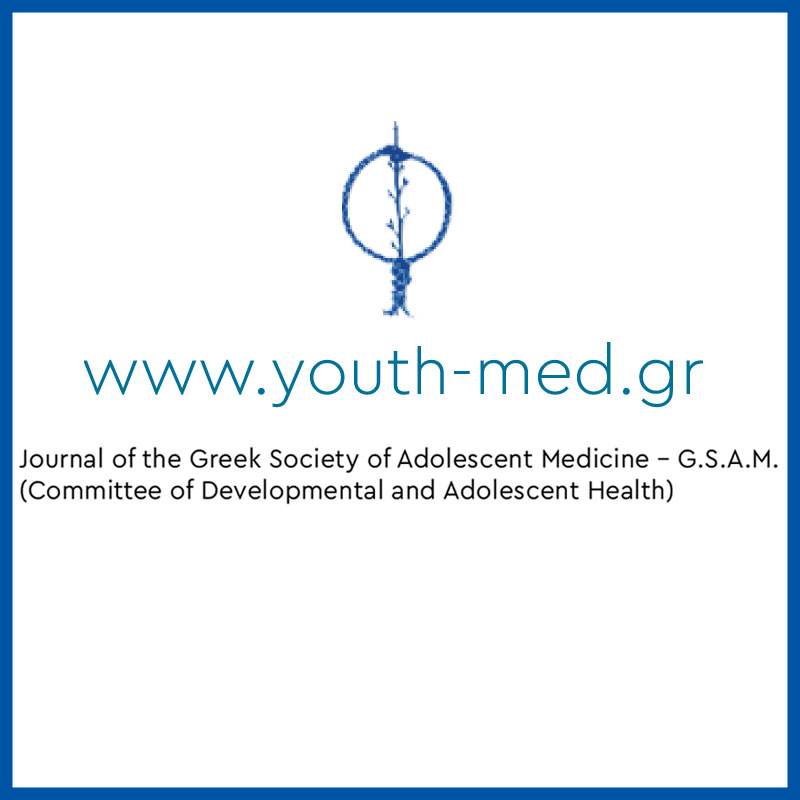Are health services adolescent friendly in Greece and worldwide? A brief report
https://doi.org/10.54088/ijh55869
Keywords:
Keywords: youth-friendly, adolescent friendly, health services, worldwide, Greece, WHOAbstract
Purpose: Adolescent health services are an important factor in adolescent health. This article helps to draw important conclusions that will be a precursor for more extensive studies and the improvement of all health services in Greece and in other countries, worldwide.
Method: We collected and analyzed a total of 15 surveys, of which 1 meta-ethnography, 3 systematic reviews, 3 clinical randomized trials, 5 cross-sectional studies and 3 reviews, which were implemented in countries of 5 continents (Asia, America, Africa, Europe and Oceania). During the analysis of the studies on the friendliness of health services, conclusions were drawn on the accessibility and utilization of these services.
Results: Greece seems to have specialized services for adolescents but it is considered insufficient to meet the WHO friendliness criteria. In Europe, several countries have adopted friendly policies, but on a practical level there is a need for more complete compliance with the criteria. Finally, in Asian and African countries, there are many health services for adolescents, but there is a need to enhance the quality of reproductive and sexual services for the treatment and prevention of adolescents of all genders and sexual orientations.
Conclusion: Based on the literature review, there is a need for further research on the provision of friendly services for adolescents, mainly in European countries, as well as upgrading the quality of services provided in low-income countries. Also, there is a great need for a standardized tool to be developed, which will be able to assess the friendliness of health services.
References
REFERENCES
Available from :https://www.who.int/maternal_child_adolescent/topics/adolescence/why-invest/en/[accessed 4/4/21]
Making health services adolescent friendly. Developing national quality standards for adolescent- friendly health services . Geneva, World Health Organization, 2012
Transforming our world: the 2030 Agenda for Sustainable Development. United Nations
Available from: http://youth-health.gr/thematikes-enotites/genika-gia-tin-efibeia/i-anaptuksi-tou-efibou-somatiki-gnostikipsuxokoinoniki?fbclid=IwAR2_cqWYW7n4SW3IzHFZHG8queLElYfemWQxVfn_9DEA0LMu6IV7bD3i9DI#.YJgMkLUzZPZ [accessed 4/4/21]
Adolescent friendly health services. An agenda of changes. Geneva, World Health Organization, 2002
World Health Organization. Making health services adolescent friendly. 2012. [accessed 5/3/21]. Available from: https://www.who.int/maternal_child_adolescent/documents/adolescent_friendly_services/en/
Ministry of Health, Republic of Kenya. National Guidelines for provision of adolescents and youth friendly services in Kenya. 2016. [accessed 5/3/21]. Available from: https://faces.ucsf.edu/sites/g/files/tkssra4711/f/YouthGuidelines2016.pdf [accessed 5/3/21]
World Health Organization. Global Strategy for Women's, Children's and Adolescent's Health 2016-2030. 2015. [accessed 12/3/21]. Available from: https://www.who.int/life-course/partners/global-strategy/en/ [accessed 5/3/21]
Zoitaki T, Dimitrakaki C, Notara V, Sakellari E, Lagiou A. The utilization of sexual and reproductive health services among young people: a cross-sectional study in Greece. Med. Res. Chronicles 2021; 8(1): 1-12[accessed 10/3/21]
Ksekalaki A. Health and adolescents in the major cities of Greece: Assessment of experiences and needs of primary health care. (Doctoral Thesis). 2020. σ.95-149. [accessed 10/3/21]
WHO. Supporting Greece in improving equitable access to SRMNCAH services. Available from: https://www.euro.who.int/en/health-topics/Life-stages/child-and-adolescent-health/news/news/2020/3/supporting-greece-in-improving-equitable-access-to-srmncah-services [accessed 16/3/21].
Malm D, Bishop L, Gustafsson P, Waenerlund AK, Goicolea I. Validation of a questionnaire to measure youth-friendliness of Swedish youth clinics. Scand J Public Health. 2017;45(4):366–72.
Carai S, Bivol S, and Chandra-Mouli V. Assessing youth-friendly-health-services and supporting planning in the Republic of Moldova. Reprod Health. 2015;(12): 1-19
Michaud PA et al. Do European Union countries adequately address the healthcare needs of adolescents in the area of sexual reproductive health and rights? Archives from Disease in childhood. 2020;105(1)
Banke-Thomas OE, Banke-Thomas AO, Ameh CA. Factors influencing utilisation of maternal health services by adolescent mothers in Low-and middle-income countries: a systematic review. BMC pregnancy and childbirth. 2017 Dec;17(1):1-4.
Chandra-Mouli V et al. A systematic review of the use of adolescent mystery clients in assessing the adolescent friendliness of health services in high, middle, and low-income countries. Global health action. 2018 Jan 1;11(1):1536412.
Mazur A, Brindis CD, Decker MJ. Assessing youth-friendly sexual and reproductive health services: a systematic review. BMC health services research. 2018 Dec;18(1):1-2.
Available from: https://reliefweb.int/report/world/regional-report-assessment-adolescents-and-youth-friendly-health-service-delivery-east [assessed 8/4/21]
James S et al. Assessment of adolescent and youth friendly services in primary healthcare facilities in two provinces in South Africa. BMC Health Services Research .2018;(18)
Williams, S., Renju, J., Ghilardi, L., Wringe, A. (2017), Scaling a waterfall: a meta‐ethnography of adolescent progression through the stages of HIV care in sub‐Saharan Africa. Journal of the International AIDS Society, 20: 21922
Songtaweesin WN et al. Youth-friendly services and a mobile phone application to promote adherence to pre-exposure prophylaxis among adolescent men who have sex with men and transgender women at-risk for HIV in Thailand: a randomized control trial. J Int AIDS Soc. 2020 Sep;23
Henderson JL et al. Integrated collaborative care teams to enhance service delivery to youth with mental health and substance use challenges: protocol for a pragmatic randomized controlled trial. BMJ open. 2017 Feb 1;7(2):e014080.
Talbott E, De Los Reyes A, Power TJ, Michel JJ, Racz SJ. A Team-Based Collaborative Care Model for Youth With Attention-Deficit Hyperactivity Disorder in Education and Health Care Settings. Journal of Emotional and Behavioral Disorders. 2020


